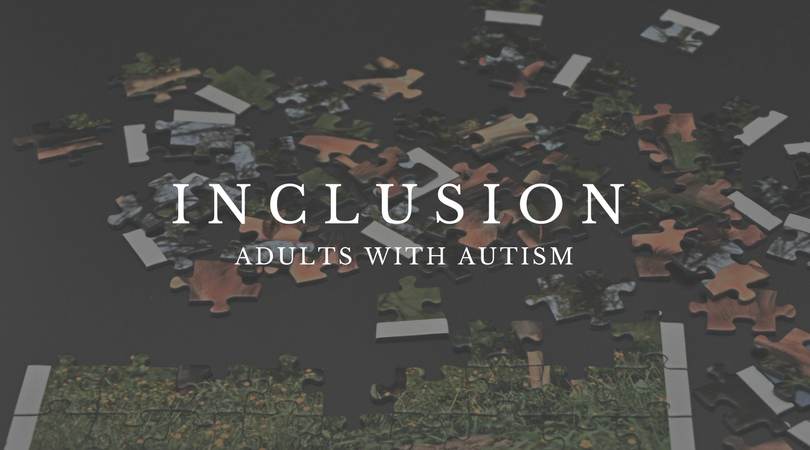April 2018

While the entertainment industry is moving forward, this population of incredibly brilliant, talented, and kind-hearted adults are still struggling to feel included in their own communities. In order to help these individuals, we as a society have to make a commitment to include these individuals that absolutely deserve our acceptance, friendship and support.
As a complex developmental disability, autism impacts development in social interaction and communication skills. Children and adults with autism can show difficulties in social interactions, verbal communication, and leisure activities. Autism, however, is a spectrum disorder and affects each individual differently. While an early diagnosis is crucial in helping assist those with autism, there are many life-long challenges that these individuals and their families must face. For example, the Autism Society estimates that the lifetime cost of caring for someone with autism ranges from $3.5 million to $5 million. Our country faces almost $90 billion in annual costs for autism research, insurance costs, Medicaid waivers, non-covered expenses, education, housing, employment, transportation therapeutic services and caregiver costs.
Autism is expensive, but it does not discriminate.
“Autism knows no racial, ethnic, social boundaries, family income, lifestyle or education level and can affect any family, and any child.”
While the Center for Disease Control and Prevention has reported that the prevalence of autism has risen to 1 in every 88 births in the United States, they have also reported that the prevalence of autism in boys has risen to 1 in 54. As the prevalence rises, it is important for our nation to recognize the opportunities available to assist the families that face a lifetime of support for their child, including the support necessary to assist their children once they become adults.
Autism may not have a presence in your family. You may not know anyone on the autism spectrum. But with such a high prevalence and affecting over 1 million people in the United States, it can be extremely beneficial to support those with autism. With the resources we now have, there are options available for supporting a population that needs our help.
Understanding
While spectrum disorders affect each individual in a different way, the entertainment industry has contributed meaningful assistance in helping our society better recognize and understand those affected by autism. Rain Man is a wonderful film that highlights the limitations an older individual with autism faces, while The Good Doctor and Atypical provide more modern exposure to the social challenges and stigmas that young adults with autism are currently facing. While the entertainment industry doesn’t provide the most accurate portrayal of the entire autism spectrum, it has greatly prioritized this population by illustrating the lives these individuals lead in a way that many audiences can understand and appreciate. One way to support adults with autism is to make an effort to better understand them, their social relationships, communication trends and unique personalities.
Acceptance
A key element in supporting adults with autism is accepting them as unique members of our communities. These individuals are just like you and me; they are seeking friendships through life stages, yearning for freedom and independence in adulthood, craving laughter and joy during rough patches, and wanting love from those around them. It is important to recognize that these individuals are just like the rest of us and accept that their uniqueness can be quite lovable. One of the adults in my life that has autism lights up a room when he is joyful by repeating certain phrases over and over again. Some may see this as a little bizarre or too different, but by recognizing that this behavior reflects his happiness, it is difficult not to smile with him and encourage his joy.
Inclusion
The most meaningful way to support an adult with autism is to consistently include them in our communities. As they are seeking friendship, invite them to help out at a community event or invite them to spend time with your family. Some movie theaters offer special movie times where they lower the volume and increase the lighting, making this an opportunity for someone with a developmental disorder to be included in a perfectly normal activity. Some groups, including Autism Services of SWLA, help these adults by connecting them to volunteer jobs in the community. This nonprofit organization not only provides housing and caregivers for these adults, but they also help these individuals find volunteer opportunities to help their community and give back to those who serve others. For example, their clients have volunteer positions at local churches, clothing donation sites, and firehouses. By offering adults with autism a place in society, we go beyond understanding their diagnosis and accepting their difficulties – we include them through love, support and friendship.
- - - - -
April is recognized as National Autism Awareness Month. Now is the perfect time to be involved in the understanding, acceptance and inclusion of children, adults and families who are affected by autism. If you want to be involved, reach out to your local Autism Society chapter, or research different local organizations on Facebook. If you want more information about the inclusion of adults, check out the amazing work at Autism Services of SWLA on Facebook – they frequently post photos of their sweet and unique clients spending time bettering their community.
---
Georgia "Gandy" Osburn
Gandy is a first-year Master of Public Service and Administration student in the Bush School of Government and Public Service